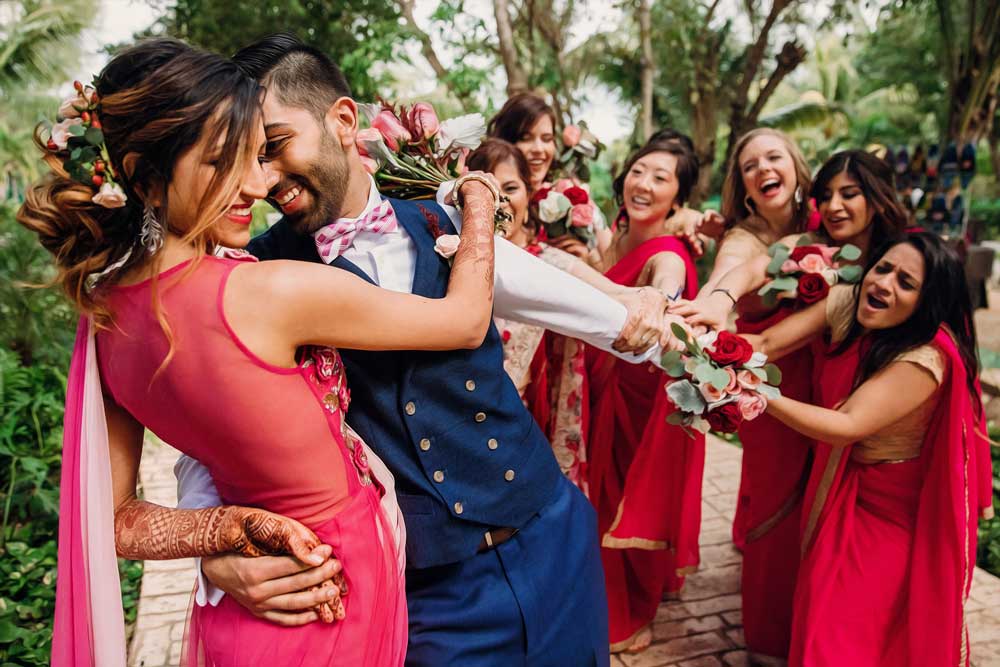Imagine a young Indian woman, raised to fit into preordained expectations of what a wedding should be. India's rich tapestry of wedding ceremonies includes aspects like the kanyadaan, mangalasutra tying, and other regional rituals that are deeply symbolic and predetermined by tradition. These rituals often leave little room for the bride’s own preferences, because weddings are traditionally seen as community functions, not personal milestones. These deeply ingrained norms foster emotional conflicts, with loyalty to one’s family colliding with personal dreams.
Despite modern narratives, arranged marriages remain overwhelmingly common. Around 90 per cent of marriages in India are still arranged. Only about 5 per cent are inter-caste, and 2.2 per cent cross religious lines. But weddings are not just cultural, they are also costly.
On average, families often spend six times their annual income on a daughter’s wedding, including dowry and celebrations. These financial dynamics deeply undermine women's autonomy, but education and economic independence emerge as crucial enablers of choice. Data from the India Human Development Survey (IHDS-II) indicates that increased education correlates strongly with autonomous or at least jointly decided marriages.
The Impact Of Urbanisation
‘In the urban scenario, wedding planning has evolved from a family-managed ritual to a creative, couple-led enterprise, where themes, décor, sustainability, and guest experience are front and centre,’ says event manager Naina Singh. ‘Driven by younger generations, there's a growing push for weddings that reflect the couple's identity through attire, decor, rituals, and the overall vibe. Recent years have seen a surge in personalised weddings, with couples intentionally customising every detail to reflect their likes and dislikes.’
A 2024–2025 WeddingWire India survey shows that 61 per cent of couples customised their wedding attire to reflect personality, and 13.5 per cent added personal, unique touches to experiences. A March 2025 IBEF study further reports that 40 per cent of couples spent over ₹7.5 lakh on wedding venues, with weddings growing more elaborate yet personalised.
Many rituals ingrained in Indian weddings can feel outdated, oppressive, or misaligned with personal beliefs. Real brides are rejecting or modifying rituals that feel wrong, negotiating with families, and designing ceremonies on their terms.

Says Kasturi Chockalingam, 'I dismissed several aspects of a traditional south Indian wedding that I found sexist. I am not an ‘object’ to be passed on from one man to another. So I refused to comply with rituals like the kashi yatra (the bride’s father begs the groom to return and marry his daughter) and rites like kanyadaan and mangalsutra that felt demeaning.'
Is The Shift Universal?
Choosing which rituals to uphold, modify, or discard is often tied to identity, self-worth, and agency. Women are rejecting rituals that feel oppressive, and seeking ceremonies that honour their values and identities. Planning is being led by the couple, rather than dictated by elders, but not universally. Traditional rituals often remain non-negotiable, particularly in conservative families or regions. Older generations retain control, and social pressure still limits full autonomy in many cases.
‘Indian women's autonomy over wedding ceremonies is still uneven and evolving. The push for weddings that feel authentic is gaining momentum, thanks to generational shifts and increased education,’ says relationship counsellor Dr Sunidhi Kurien. ‘But women's voices, especially the bride’s, can sometimes be overshadowed by parental expectations or even extended family influence.’
She says, ‘Using allies within the family system is a good way to begin change and women can sociologically benefit from this. Lean on supportive family members such as siblings, cousins, or aunts, who respect your choices and amplify your voice.’
She adds that in India, saying no to elders is often confused with disrespect. The key is to set boundaries without being confrontational. ‘Tell them that you’ll keep one or two specific rituals that are important to them, but also want to factor in aspects that matter deeply to you. This way, it seems like you’re trying to create a balance. Propose fusion rituals that respect tradition but reflect your identity. If needed, create a spreadsheet with non-negotiables, preferences, and compromises. Share it to ensure transparency. You’re more likely to be heard when you offer solutions, not just resistance.’
Sometimes, if the family still remains unreasonable, she says learning to say no is the best outcome. ‘Do this without guilt or confrontation. Be assertive, but calm and clear. Make sure your partner is in your corner. Many Indian women are raised to seek approval, especially from elders or in-laws. Remind yourself that universal approval is not your goal, at the cost of your own happiness. Don’t be a people-pleaser, saying yes because you don’t want to be seen as difficult or rebellious. If the bride or couple is contributing financially, it’s easier to assert control in this regard.’